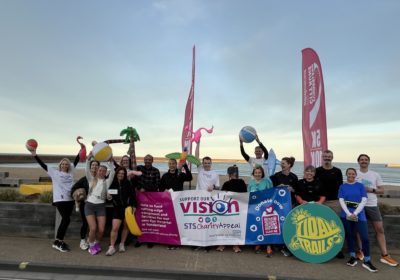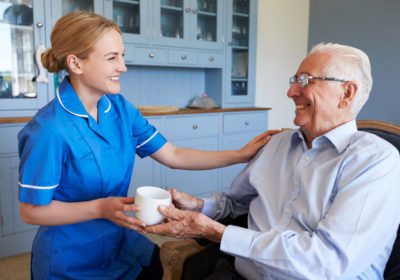Pharmacies across the country will begin offering the new contraceptive service in December with almost half a million women able to access the pill next year without needing to contact their GP first.
The rollout is part of the NHS and government’s primary care access recovery plan, announced by the head of the NHS and the Prime Minister in May, which committed to making it quicker and easier for millions of people to access healthcare on their high street.
Pharmacists will also ramp up the number of life-saving blood pressure checks given to at-risk patients over the next year with a commitment to deliver 2.5 million a year by Spring 2025 – up from 900,000 carried out last year. It is estimated this could prevent more than 1,350 heart attacks and strokes in the first year.
And beginning from early next year, patients will also be able to get treatment for seven common conditions directly from a pharmacy, without the need for a GP appointment or prescription. The new service will cover sinusitis, sore throat, earache, infected insect bite, impetigo, shingles, and uncomplicated urinary tract infections in women.
The ambitious blueprint aims to free up to 10 million GP appointments a year by next winter, and give the public more choice in where and how they access care.
Amanda Pritchard, NHS chief executive, said: “The care and support people receive from their local pharmacy is rightly highly valued by patients and so it is essential we use the skills and convenience of community pharmacies to make it as easy as possible for people to get the help they need.
“This is really good news for women – we all lead increasingly busy lives, and thanks to this action, rather than making a GP appointment, they can simply pop into their local pharmacy when they need or want to access contraception.
“We will also be expanding services so that more health checks are available for patients on the high street, which is not only better and easier for patients but also frees up NHS time for more GP appointments for those who need them most.”
As more pharmacies begin offering the contraceptive service, nhs.uk web page will be updated so women can check which pharmacy near to them is offering access to contraception.
For the first time across England, women will be able to walk into their local pharmacy to be supplied oral contraception for the first time, in addition to being able to receive their next supply.
Health and Social Care Secretary, Victoria Atkins, said: “It is a pleasure to start my time as Secretary of State with such a positive example of the government, NHS and pharmacy sector working together to reach an agreement to improve services and save lives.
“For the public these changes will mean more options for women when making a choice about their preferred contraception, reduce the risks of people suffering heart attacks and strokes and make it easier to access medicines for common conditions.
“And for healthcare professionals this will free up GP appointments and make better use of the skills and expertise within community pharmacies.”
The plans, known as Pharmacy First, aim to utilise high street chemists more effectively as part of the wider primary care recovery plan and help improve access to general practice by freeing up appointments.
Dr Claire Fuller, NHS medical director for primary care and the NHS’ lead GP in England said: “I’m delighted the changes that the NHS is making mean people will have new and convenient ways of accessing treatments for many common conditions. In particular, contraception is essential for many women, and this is a big step forward in making these services easier for women to access.
“Local pharmacies are trusted parts of our communities and GPs and pharmacists work closely together. Pharmacists have always provided continuity and long-term support to patients, families, and carers. So, this is a safe and common-sense way of making NHS services easier for patients to use”.
Community pharmacies are staffed by skilled and qualified health professionals. A consultation has already been launched to enable pharmacy technicians to supply and administer medicines and the responses are currently being reviewed.
Janet Morrison, Chief Executive at Community Pharmacy England, said: “It makes perfect sense to use community pharmacies as a first port of call for healthcare advice, access to contraception and health checks such as blood pressure tests.
Local pharmacies are staffed by highly qualified healthcare professionals and empowering them to do more is a logical next step for primary care. These new services will help patients and the public, as well as reducing pressure on GPs and the wider NHS.
“The investment in these services is desperately needed and welcome: pharmacies want to offer these services, and in future, we hope to see pharmacies getting even more support, with more services available and independent prescribing commonplace.
“Pharmacy teams will remain very busy throughout this winter but they will be working hard to build these new services into their daily workload when they relaunch. We hope that members of the public will want to take full advantage of the offer from community pharmacies in due course.”
David Webb, Chief Pharmaceutical Officer for England, said: “Pharmacy First demonstrates the significant and exceptional contribution of community pharmacy teams to the NHS. This further expansion of clinical services delivered by pharmacy teams in local collaboration will enable thousands of people to access the help and care they need quickly and conveniently.”
Jacob Lant, Chief Executive at National Voices, said: “We often hear, from our members, about the vital role Pharmacists play in supporting people to access the care and support they need, especially people living with long-term conditions and multi-morbidity, and people at greater risk of experiencing health inequalities. This is a positive step in giving people more meaningful choices and we welcome the move to expand community pharmacy services and enable people to access help and support at a time and in a way which is right for them.”
Rachel Power, Chief Executive, Patients Association, said: “Community pharmacy’s accessibility and characteristics, such local staff, are a huge asset to a community so we welcome the expansion of community pharmacy services. Enabling pharmacists to prescribe for common conditions and initiate treatments, expands choice for patients.”
William Pett, Head of Policy, Public Affairs and Research at Healthwatch England, said: “Women across England will welcome the convenience of getting the contraceptive pill at a local pharmacy. Being able to see your GP in a timely manner remains the public’s top concern. If this initiative is effectively communicated and delivered, it will make a real difference to patients and relieve the pressure on hard-pressed services.
“There could be potential problems, such as pharmacists not being able to see enough of people’s GP records or the ability of different communities and areas to access the new service. However, if evaluated well, the NHS will be able to ensure that this promising new service really works for patients.”
Ms Tase Oputu, Chair of the Royal Pharmaceutical Society’s English Pharmacy Board, said: “This move will provide women with greater choice in obtaining contraception and advice in the way that best meets their needs. Pharmacists are experts in medicines and perfectly placed to provide relevant health checks and ongoing support for women accessing contraception. The trials of this scheme showed a widespread welcome for the service and the convenience community pharmacy offers as the front door to the NHS. It also makes suitable use of the clinical skills of pharmacists in partnership with GPs and existing sexual health services.
“We welcome the ability of community pharmacy teams to treat these seven conditions from February, as this is the first step towards a vision of wider prescribing services in pharmacy, using the clinical skills of pharmacists. We have long been calling for improved digital integration to improve the efficiency of pharmacy services for patients and health care professionals alike. We are pleased that today’s announcement also acknowledges the digital investment and records accesses that is required to make the Pharmacy First Service a clinical success”.
Dr Leyla Hannbeck, CEO of the Association of Independent Multiple Pharmacies, said: “This is a step in the right direction for patient care. The pharmacy network has the knowledge, skillsets and the willingness to deliver these services and support the NHS. For years we have been highlighting that if supported appropriately pharmacies can add a lot of value to the NHS. We are accessible and we have a track record of delivering for patients.”
Nick Kaye, chair of the National Pharmacy Association, said: “Having been amongst those to deliver a locally commissioned walk-in common ailments service in community pharmacies in Cornwall, I’ve seen first-hand how improving access to advice and treatment works for GPs, pharmacists and above all patients. Today’s deal means that people across the whole country will soon be able to benefit from pharmacists’ prompt and expert support. NHS England have put their faith in us, having seen community pharmacy successfully deliver other clinical services at scale.”
Malcolm Harrison, Chief Executive of the Company Chemists’ Association, said: “Pharmacy teams across the country provide high quality, essential care to their local communities, and today’s announcements will mean that they are able to do even more for NHS patients. These measures will free up GP capacity and make it quicker and easier for patients and the public to receive the care they need. The launch of ‘Pharmacy First’ is a huge vote of confidence in the sector and marks a first and crucial step in transforming the role of pharmacy to provide ever more care for patients”.
More than a hundred pharmacies took part in the contraceptive pilot earlier this year with more than 4,500 women who had already accessed the pill able to receive an ongoing supply of oral contraception at their local pharmacy.
Source: NHS England » Pharmacy reforms to bring new services to the high street






